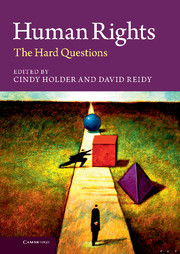Book contents
- Frontmatter
- Contents
- Figure
- List of table
- Notes on contributors
- Introduction
- Part I What are human rights?
- Part II How do human rights relate to group rights and culture?
- Part III What do human rights require of the global economy?
- Part IV How do human rights relate to environmental policy?
- Part V Is there a human right to democracy?
- Part VI What are the limits of rights enforcement?
- Part VII Are human rights progressive?
- Index
Introduction
Published online by Cambridge University Press: 05 May 2013
- Frontmatter
- Contents
- Figure
- List of table
- Notes on contributors
- Introduction
- Part I What are human rights?
- Part II How do human rights relate to group rights and culture?
- Part III What do human rights require of the global economy?
- Part IV How do human rights relate to environmental policy?
- Part V Is there a human right to democracy?
- Part VI What are the limits of rights enforcement?
- Part VII Are human rights progressive?
- Index
Summary
Background
Over recent decades human rights have moved center stage within the theory and practice of international law and politics. This development has drawn the attention of philosophers, lawyers, political scientists, anthropologists, activists, politicians and diplomats, and others eager to understand or shape international law and politics. Whether as cause or effect (perhaps a bit of both) of this attention, there can be little doubt any longer that, as a feature of international law and politics, human rights are here to stay. So, too, then are the many questions, theoretical and practical, they raise.
As a theoretical matter, the most general questions to be raised about human rights concern their nature, function, justification and content. There is considerable overlap in and interaction between these questions, of course. How one thinks about the nature or function of human rights will shape how one thinks about their justification and content, for example. But it is nevertheless illuminating to consider the questions separately, at least initially.
- Type
- Chapter
- Information
- Human RightsThe Hard Questions, pp. 1 - 20Publisher: Cambridge University PressPrint publication year: 2013
- 1
- Cited by

